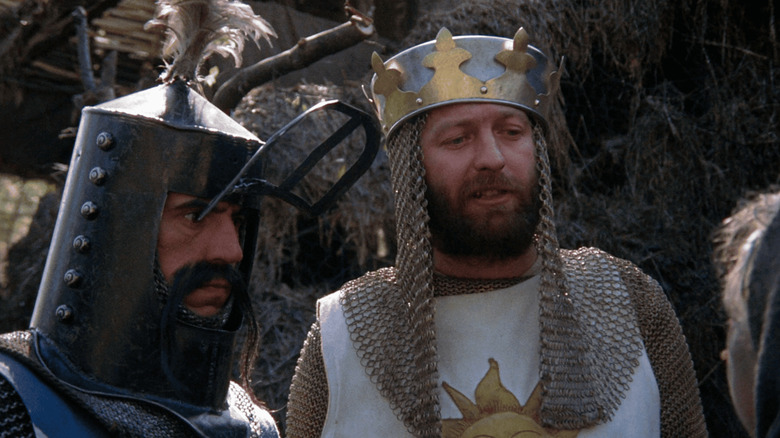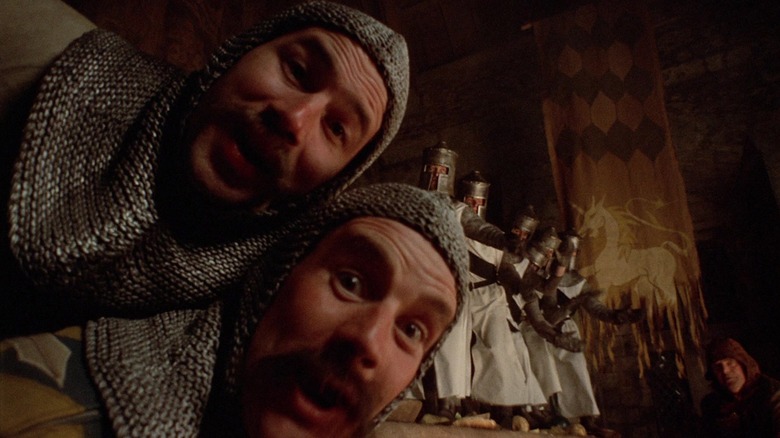Monty Python And The Holy Grail Was Funded By Rock Stars Looking For A Tax Write Off
Monty Python had quickly become a sketch comedy sensation in the early 1970s via records and their television show ("Monty Python's Flying Circus"), so it was only natural that the Pythons would desire to succeed in the movie realm, as well. Their first go at a feature was 1971's "And Now for Something Completely Different," which featured re-shot versions of some of the troupe's most popular skits. It was a hit on the midnight film circuit, but, as essentially a greatest hits compilation, didn't broaden their popularity.
Brimming with confidence, the gang decided to make an actual narrative film their second time out — one that would skewer the Arthurian legend while at the same time unabashedly reveling in bad taste.
"Monty Python and the Holy Grail" marked the first feature directorial effort for Python members Terry Jones and Terry Gilliam (the first movie was helmed by TV director Ian MacNaughton), which scared the studios. Jones and Gilliam certainly did themselves no favors by announcing that they would like their film to have the visual aesthetic of a movie by Pier Paolo Pasolini (whose deeply disturbing "Salò, or the 120 Days of Sodom" was in production at the same time). In any event, when studios proved unwilling to kick in a single cent, the boys turned to major rock acts like the notoriously litigious Led Zeppelin, Elton John, and Pink Floyd. Their pitch was that it would be a good tax write-off, which was immensely appealing, given that the UK top income tax rate was hovering around 90% at the time. Numerous famous people wound up investing in this ludicrous undertaking. How did it work out for them?
Led Zeppelin and Pink Floyd helped make Monty Python and the Holy Grail possible
In a 2002 interview with The Guardian, Gilliam indicated that the investments didn't exactly pay off. "Elton John, Pink Floyd, Led Zeppelin, they all had money, they knew our work, and we seemed a good tax write-off. Except, of course we weren't. It was like 'The Producers,'" he explained.
According to a 2021 tweet from Eric Idle, the total investment at the time was £175,350, which converted to U.S. dollars and adjusted for inflation amounts to around $2.7 million. The bulk of the financing came from Michael White Limited (£78,750), but the music acts were quite generous as well. Led Zeppelin (£31,500), Pink Floyd (£21,000) and Jethro Tull's Ian Anderson (£6,300) did their part, as did music labels like Island Records (£21,000), Charisma Records (£5,200) and Chrysalis Records (£6,300). Even Andrew Lloyd Webber's frequent lyricist, Tim Rice, contributed £5,250 through his cricket team Heartaches.
The best part for these folks is that their financial interest was extended to include the smash hit Broadway musical "Spamalot." It'd be interesting to hear from the above how substantial those yearly "Monty Python and the Holy Grail" returns are; they probably have no idea, but their financial advisors are no doubt very pleased. Should a film version of "Spamalot" ever come to pass, their earnings could explode like the Holy Hand Grenade of Antioch.

